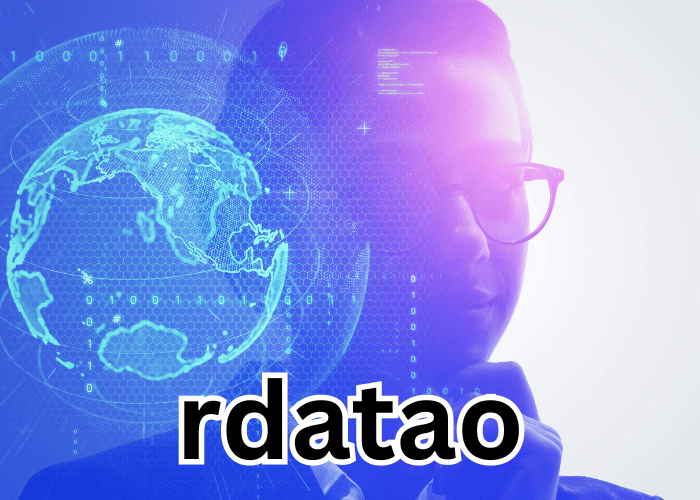Table of Contents
Introduction
In today’s data-driven world, the term “rdatao” is gaining attention as a significant concept in various fields, from technology and business to healthcare and beyond. While the exact meaning of “rdatao” might not be universally recognized, it represents a niche yet pivotal area of study and application. This article aims to explore the multifaceted nature of rdatao, providing a thorough understanding of its implications, applications, and future potential.
Defining rdatao
The term rdatao is an intriguing one, potentially an acronym or a coined term related to data analysis, research, or a specific technological field. Understanding rdatao requires exploring its possible origins and meanings, as well as how it distinguishes itself from similar terms.
Etymology and Possible Interpretations
While the exact origin of rdatao is unclear, it might combine elements of research data and operations, suggesting a focus on data-driven operational strategies. Alternatively, it could refer to a specialized software, a methodology, or a concept in data analytics.
Common Uses and Applications
rdatao could be employed in contexts such as big data analysis, artificial intelligence, or machine learning. It may denote a framework or set of tools used to manage and analyze large datasets, providing insights and supporting decision-making processes.
Distinguishing rdatao from Similar Terms
To better understand rdatao, it’s essential to distinguish it from other data-related concepts like big data, data science, or data analytics. While these fields share commonalities, rdatao may offer unique methodologies, technologies, or approaches.
Historical Background and Development
The evolution of rdatao likely parallels the advancements in data technology and analytics. Tracing its development offers insights into how it has shaped and been shaped by technological progress.
Origins and Evolution of rdatao
The inception of rdatao might coincide with the rise of big data and the need for more sophisticated data analysis tools. As data became a critical asset, new methodologies like rdatao emerged to handle the complexity and volume of information.
Key Milestones and Developments
Key milestones in the development of rdatao could include the introduction of advanced data processing algorithms, the integration of AI and machine learning, and the adoption of cloud computing technologies.
Influence of Technological Advancements on rdatao
Technological advancements, such as increased computational power and the proliferation of IoT devices, have likely propelled the growth of rdatao. These technologies enable more efficient data collection, storage, and analysis, expanding the scope and capabilities of rdatao.
Applications of rdatao in Various Fields

The potential applications of rdatao are vast, spanning numerous industries and sectors. By exploring its uses, we can appreciate the versatility and impact of this concept.
Technology and Data Analysis
In the realm of technology, rdatao might be crucial for big data analysis, offering tools and methodologies to process and interpret vast datasets. It could also play a significant role in developing AI models, providing the data backbone for training and optimization.
Integration with Artificial Intelligence and Machine Learning
The integration of rdatao with AI and machine learning can enhance predictive analytics, automate processes, and enable more personalized user experiences. This synergy is particularly valuable in areas like customer segmentation, recommendation systems, and natural language processing.
Business and Marketing
In business, rdatao could be a game-changer for customer insights and market research. By analyzing consumer data, businesses can better understand customer behaviors, preferences, and trends, leading to more targeted marketing strategies and improved product offerings.
Strategies for Leveraging rdatao in Business Decision-Making

Companies can leverage rdatao to make data-driven decisions, optimizing everything from supply chain management to customer service. The ability to analyze real-time data allows for agile responses to market changes and enhances competitive advantage.
Healthcare and Medicine
In healthcare, rdatao might be applied to patient data management, facilitating more accurate diagnoses and personalized treatment plans. It could also support medical research, providing insights into disease patterns and treatment efficacy.
Impact on Personalized Medicine and Healthcare Delivery
By enabling more precise analysis of patient data, rdatao can contribute to the advancement of personalized medicine. This approach tailors treatments to individual patients based on their unique genetic and health data, improving outcomes and reducing costs.
Challenges and Ethical Considerations
While rdatao offers numerous benefits, it also presents challenges, particularly concerning data privacy and ethics. Addressing these issues is critical for responsible and effective use.
Data Privacy and Security Concerns
The use of rdatao in analyzing personal data raises significant privacy concerns. Ensuring data security and compliance with regulations like GDPR is essential to protect individuals’ information and maintain trust.
Ethical Implications of Using rdatao
The ethical implications of rdatao extend beyond privacy. The potential for biased data or misuse of information poses risks, necessitating ethical guidelines and standards to govern its application.
Regulatory Landscape and Compliance Issues
Navigating the regulatory landscape is crucial for organizations using rdatao. Compliance with data protection laws and industry-specific regulations ensures the lawful and ethical use of data.
Future Trends and Innovations
The field of rdatao is likely to continue evolving, driven by emerging technologies and changing market needs. Anticipating future trends can help stakeholders stay ahead of the curve.
Emerging Technologies Related to rdatao
Technologies such as blockchain, quantum computing, and advanced AI are poised to impact rdatao significantly. These innovations can enhance data security, processing speed, and analytical capabilities.
Predictions for the Future Impact of rdatao on Various Industries
The future impact of rdatao could be profound, transforming industries like finance, retail, and manufacturing. Enhanced data analytics can lead to more efficient operations, better customer experiences, and innovative business models.
Opportunities for Research and Development

As rdatao continues to develop, there are ample opportunities for research and innovation. Exploring new methodologies, technologies, and applications can unlock further potential and address existing challenges.
Case Studies and Real-World Examples
Real-world applications of rdatao provide valuable insights into its practical benefits and challenges. Analyzing these cases can highlight best practices and lessons learned.
Success Stories and Case Studies Demonstrating the Use of rdatao
Successful implementations of rdatao might include businesses that have leveraged data analytics to improve customer satisfaction or healthcare providers that have used it to enhance patient care.
Lessons Learned from Practical Applications
These case studies can offer lessons on overcoming challenges such as data integration, scalability, and user adoption. They also underscore the importance of ethical considerations and regulatory compliance.
Impact on Business Outcomes and Societal Benefits
The impact of rdatao extends beyond business outcomes, offering societal benefits such as improved public health, environmental sustainability, and better-informed public policies.
Conclusion
The exploration of rdatao reveals its multifaceted nature and broad applicability. As a concept or methodology, rdatao offers significant potential for innovation and improvement across various fields. Understanding its nuances, applications, and challenges is crucial for leveraging its full potential.
FAQs
- How does rdatao differ from traditional data analysis methods?
- Unlike traditional data analysis, rdatao may incorporate advanced technologies such as AI, machine learning, and big data analytics, enabling more complex and nuanced insights. It emphasizes real-time analysis and predictive capabilities.
- What industries can benefit most from rdatao?
- Industries such as technology, healthcare, finance, and retail can benefit significantly from rdatao. It helps these sectors optimize operations, improve customer experiences, and develop innovative solutions.
- What are the ethical considerations when using rdatao?
- Ethical considerations include data privacy, security, and the potential for bias in data analysis. It is essential to implement ethical guidelines and adhere to regulatory standards to ensure responsible use.
- What are the future trends and innovations in the field of rdatao?
- Future trends include the integration of emerging technologies like blockchain and quantum computing, advancements in AI and machine learning, and the increasing importance of real-time data analytics. These innovations promise to enhance the capabilities and applications of rdatao.




